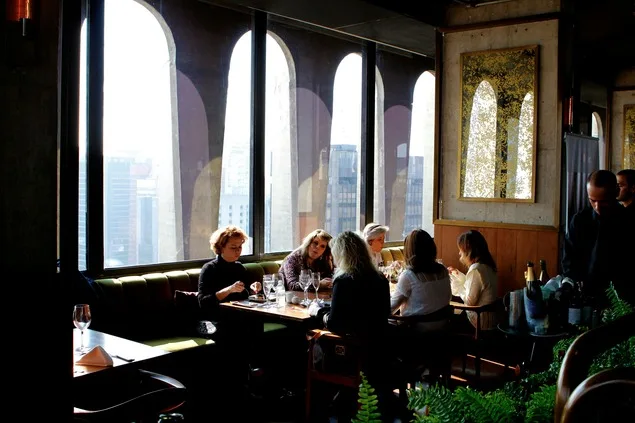Topics: Finance and Accounting Transformation, Hospitality Accounting
Strategic Financial Planning for UK Hospitality: Lessons from Recent Business Closures
Posted on January 22, 2025
Written By Miyani Lourembam

The year 2024 was a wake-up call for the UK hospitality industry. With the wave of closures in 2024 affecting everything from Michelin-starred restaurants to casual dining chains, the industry’s vulnerabilities have come into sharp focus. Despite a slight easing in Q3 2024, monthly insolvencies have consistently exceeded 260, underscoring the challenging trading conditions and the critical importance of hospitality financial forecasting.
What went wrong? And more importantly, how can CFOs and financial leaders turn the tide? This blog dives into the stories behind these closures, the issues they faced, and how strategic financial planning for UK hospitality and restaurant business resilience planning can provide actionable strategies to secure the future of hospitality businesses.
The Stories Behind the Closures
Greens
Simon Rimmer’s vegetarian restaurant chain, Greens, operated for an impressive 33 years before its closure in 2024. Rising rents and operational costs forced the original Didsbury site to close in January, with the Sale location following in September. The collapse left debts exceeding £500,000, illustrating the need for effective restaurant cash flow management to ensure financial sustainability.
Lewtrenchard Manor
The historic Lewtrenchard Manor, Devon, closed its doors due to “difficult trading conditions,” leaving 25 staff members unemployed. The company operating the three-star hotel and two AA-rosette restaurants entered liquidation in April 2024, with debts exceeding £400,000. Creditors include HMRC, owed over £213,000 in unpaid VAT and income tax, and The Baring-Gould Corporation, the hotel’s landlord, owed £50,000.
Cube Hotel, Birmingham
This modern boutique hotel entered administration in August 2024, citing unsustainable debt and reduced occupancy rates. Challenges included higher operational costs and a post-pandemic decline in corporate travel. Cube Hotel, alongside the Marco Pierre White rooftop restaurant, was listed for sale with a guide price of £12 million.
TGI Fridays
The UK operator of TGI Fridays fell into administration in September 2024, leading to the closure of 35 restaurants and over 1,000 job losses. Despite a rescue deal saving 51 locations, the chain struggled with declining sales, high inflation, and rising labour costs. Closures in cities like Birmingham, Brighton, and Manchester highlight the intense financial pressures facing casual dining chains today.
Karen’s Diner
Britain’s “rudest restaurant,” Karen’s Diner, closed all its UK locations in 2024 after its parent company, Viral Ventures UK, reportedly amassed over £400,000 in debt. Despite expanding rapidly in 2023 with sites in Sheffield, Manchester, and Birmingham, the chain’s collapse was announced in September, marking the end of its brief but contentious presence in the UK dining scene.
Royal Beacon Hotel
The Royal Beacon Hotel in Exmouth permanently closed, citing unsustainable rising costs as the primary reason. The 52-bedroom, partly Grade II listed property had been listed for sale earlier in the year for £2.5 million by Richardson Hotels. The closure reflects ongoing financial pressures in the hospitality sector, with the hotel’s director describing the challenges as a “tsunami of increased costs.”
Hotel Victoria
The iconic Hotel Victoria in Newquay, Cornwall, closed its doors, along with neighbouring venues Bertie’s nightclub, pub, and Mexican restaurant. Sixty staff members are undergoing redundancy as the 19th-century property changes ownership. Rising costs and shifting consumer behaviours continue to challenge the sustainability of legacy businesses in the hospitality sector.
Hungry Cow
Welsh burger chain Hungry Cow announced the closure of its Colwyn Bay and Flint locations, citing the challenges of managing multiple sites. The family-run business is now focusing on its Mold Bar & Restaurant. For brands facing similar difficulties, restaurant business resilience planning is essential to optimise operations and ensure sustainable growth.
Stapleford Park Hotel
The luxury Stapleford Park Hotel, near Melton Mowbray, closed with immediate effect due to “adverse trading conditions.” Despite attempts to maintain operations through hotel management partnerships and shareholder investments, the hotel could not generate sufficient revenue to remain viable. All 92 staff members were made redundant and have been directed to the Redundancy Payments Service for eligible claims.
Ibérica
Upmarket tapas chain Ibérica closed three of its five UK restaurants in December 2024 after entering administration, citing post-pandemic challenges such as rising costs, staff shortages, and reduced consumer spending. The closures included the Marylebone, Canary Wharf, and Leeds locations. The remaining Farringdon and Victoria sites were acquired by Camino Group, transferring 40 staff members and offering a potential lifeline to part of the business.
The ripple effects of rising costs, shifting consumer behaviours, and labour shortages in UK hospitality have continued into 2025, with notable closures in January. Locanda Locatelli closed after 23 years, citing undisclosed reasons, while The Expanse Hotel in Bridlington shut its doors after nearly 90 years due to trading difficulties, though its apartments will remain operational. Chipotle also closed its Watford branch, reflecting the challenges of scaling beyond London amid rising costs and cautious spending.
Despite widespread closures, the hospitality sector isn’t solely in decline. Some closures are part of broader growth strategies, such as Whitbread closing over 200 restaurants to expand its Premier Inn brand or The Botanist parent company using a CVA to refocus resources, including plans for a new Bournemouth location in 2025.
What Challenges Did They Face?
1) Rising Operational Costs
High energy prices since 2022 have severely impacted the hospitality sector, especially energy-intensive operations. Inflation-driven increases in essential supplies, including food, beverages, and operational resources, have further reduced margins, making financial sustainability difficult.
2) Labour Shortages
Recruitment and retention challenges remain significant due to rising wages, stricter post-Brexit immigration rules, and a shrinking labour pool. These issues have affected businesses’ ability to deliver quality service, from front-line staff to skilled roles.
3) Changing Consumer Behavior
The cost-of-living crisis has caused consumers to cut back on spending across the sector, from discretionary leisure activities to premium services. Trends like shorter travel stays, reduced alcohol consumption, and an increased focus on value for money have created new challenges for operators, emphasising the importance of adopting effective hospitality business survival strategies to navigate these shifts.
4) Supply Chain Disruptions
Global supply chain issues have led to delays and price increases for essential goods. From sourcing food and beverages to securing materials for maintenance and refurbishment, operators have struggled to balance affordability with maintaining service quality.
5) Competitive Market Pressure
The rise of agile and innovative competitors has intensified market competition. Independent operators, emerging business models, and direct-to-consumer trends have required established players to adapt quickly to evolving consumer preferences.
6) Government-Driven Cost Increases
Rising National Insurance contributions, VAT rate changes, and increased compliance costs have significantly pressured the sector. These financial burdens have made it harder for businesses to operate profitably, especially during economic uncertainty.
7) Debt Accumulation
High debt levels have proven unsustainable for some operators. Businesses with heavy borrowing obligations have struggled to manage repayments amidst rising operational costs and declining revenues, forcing closures or sales.
8) Post-Pandemic Recovery
While many businesses hoped for a swift recovery, the lingering effects of the pandemic have hindered a return to pre-2020 demand levels. Reduced corporate travel and slower rebounds in group bookings have particularly affected urban and event-focused establishments.
These challenges illustrate the volatile environment in which hospitality businesses operate today. For many, the combination of these factors created an insurmountable financial burden, leading to closures that impacted employees and reshaped the sector’s landscape.
What Can CFOs Do to Steer Through the Crisis?
The challenges demand decisive and forward-thinking leadership, particularly from CFOs. Financial leaders play a pivotal role in guiding businesses through uncertain times by focusing on:
- Advanced Financial Forecasting: Utilise hospitality financial forecasting tools to anticipate market fluctuations and optimise cash flow management to ensure long-term financial stability.
- Cost Management: Renegotiating supplier contracts, investing in energy efficiency, and outsourcing non-core functions to reduce overheads.
- Revenue Diversification: Expanding into delivery, subscriptions, or tech-driven solutions to offset declining foot traffic and attract new customer segments.
- Outsource Non-Core Functions: Leverage hospitality outsourcing solutions and delegate tasks like accounting, payroll and marketing to lower administrative burdens and focus on strategic growth.
- Technology Integration: Implementing real-time analytics, financial planning tools for CFOs and digital platforms to improve operational efficiency and respond to market trends quickly.
Lessons for the Future
The closures of 2024 and early 2025 underscore that survival in the UK hospitality sector, which faces financial challenges in 2025, requires persistence, adaptability, and strategic foresight. Businesses that weather the storm of rising costs changing consumer behaviours, and operational hurdles take deliberate steps to strengthen their foundations and evolve alongside market demands. Solid financial planning for UK hospitality is a must to tackle economic pressures in the UK Restaurant industry and other hospitality industry sectors.
For businesses to remain resilient and achieve growth, proactive strategies are crucial. Delegating essential tasks like accounting and payroll can reduce administrative strain, enhance financial clarity, and provide deeper insights into vital business metrics. This approach supports effective risk management, enabling businesses to spot potential challenges early and develop strategies to prevent financial setbacks.
If you’re ready to tackle these challenges and secure your business’s future, we’re here to help. Our team of experts specialises in finance and accounting for the hospitality industry, taking over these critical processes to help you reduce costs, eliminate discrepancies, and ensure seamless operations. By outsourcing, you can focus on growing your core business while we handle your financial and accounting needs precisely and efficiently.
Partner with us to ensure your business not only withstands today’s challenges but thrives in an evolving market.
Originally published Jan 22, 2025 04:01:15, updated Feb 27 2025
Topics: Finance and Accounting Transformation, Hospitality Accounting







